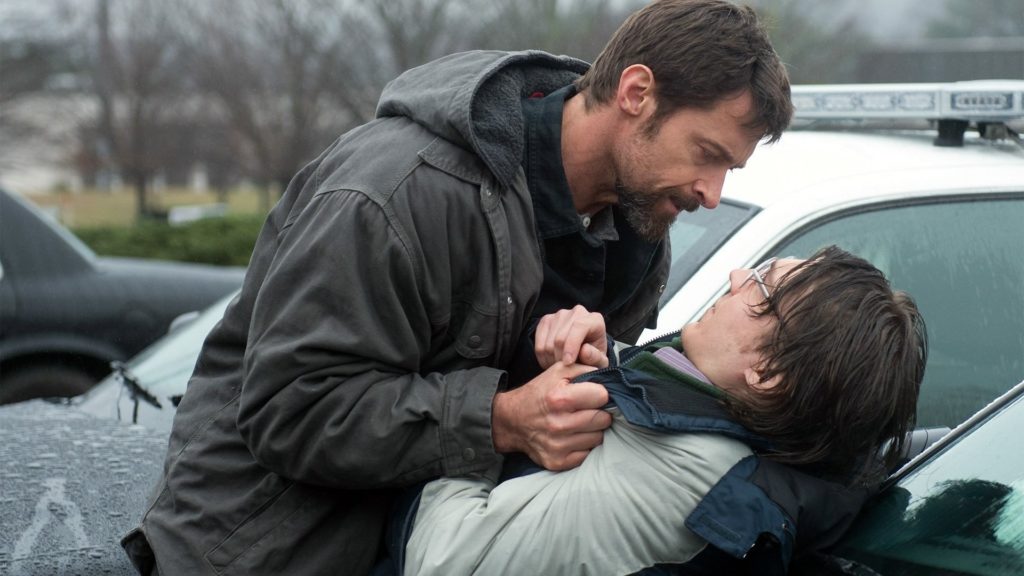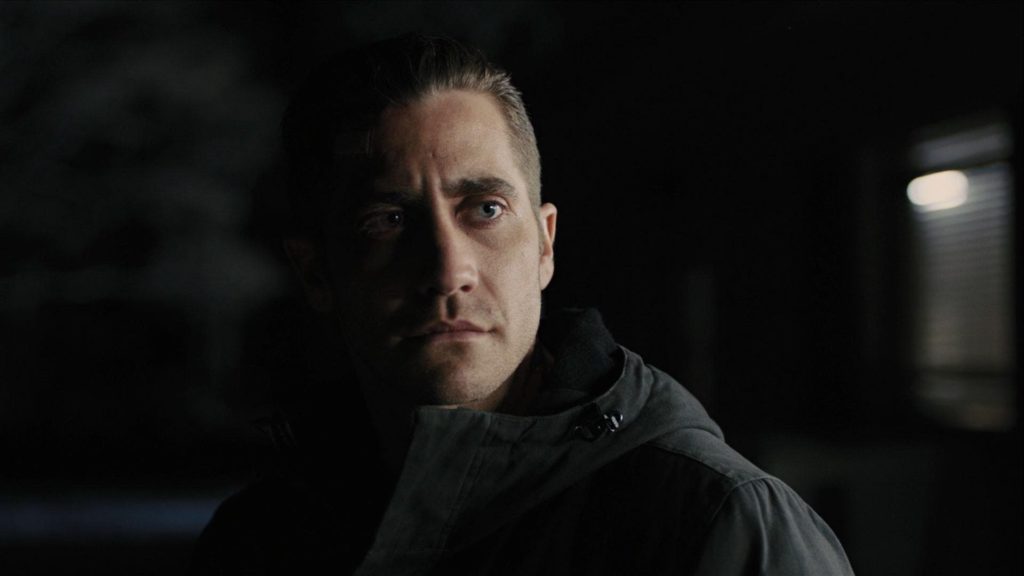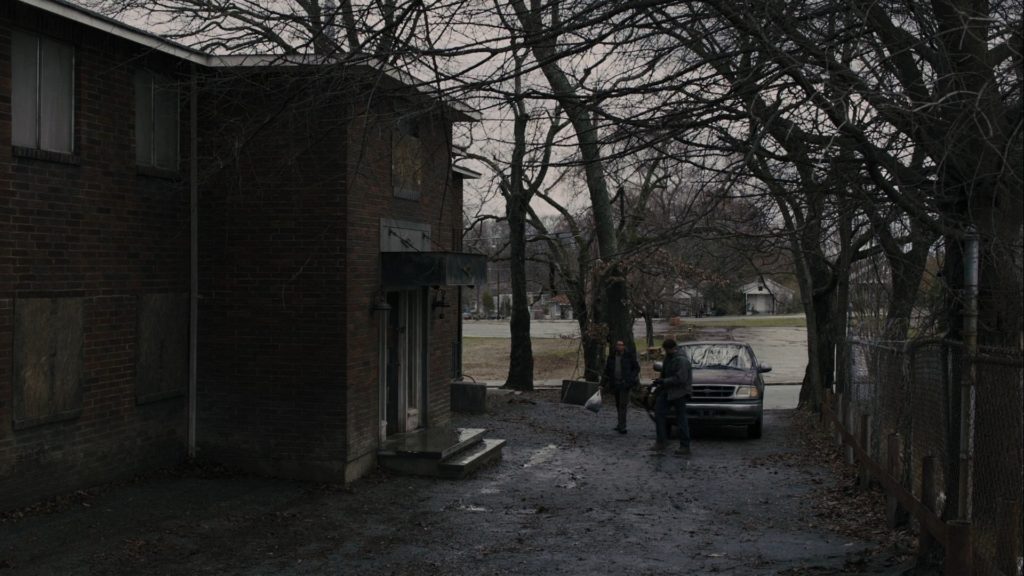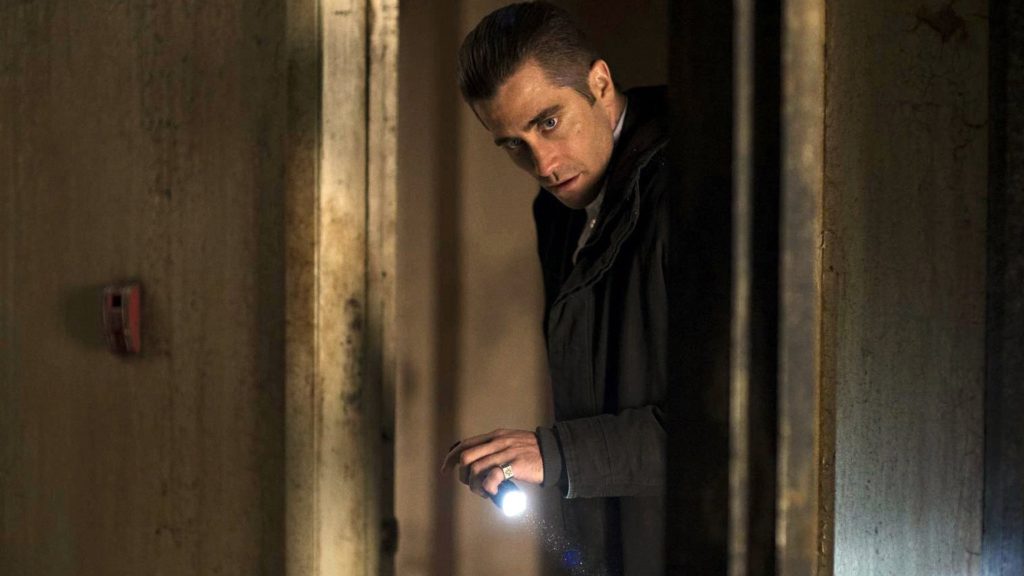I hear the train a-comin', it's rolling 'round the bend
It’s strange: With Prisoners, Denis Villeneuve has a bigger budget, a more talented cast and crew, a script that he did not write himself, a new language to film in, an entirely new genre… and it still feels like a remake of Incendies in a new skin and culture. It has the same tug-of-war between serious drama, a cudgel of political commentary, and potboiler plotting, the same haphazard sequencing and cadence of twists, the same disregard for plot holes and inexplicable coincidences, the same two-threaded narrative structure, the same thematic obsessions (cycles of violence, radical religiosity obliterating family units), the same portentous darkness, and the same structural tricks (reframing early scenes with new bits of key information). Second verse, same as the first.
And much like Incendies, it offers a stupid, fun final half hour dense with tension and surprises such that I ended up walking away with a positive reaction to the film despite recognizing that I’d just been played with the ol’ Villeneuve razzle-dazzle covering up a flawed thriller.
(To be fair, Villeneuve made Enemy before he made Prisoners even though the latter premiered first, so he had at least had at least one Hollywood go-round, with a very different kind of film, between Incendies and this.)

With Prisoners, Villeneuve is operating in a Finchian crime thriller mode instead of a novelistic family drama mode. The story kicks off with the disappearance of two young girls. Detective Loki (sigh; yes, that’s really his name) (Jake Gyllenhaal) arrests the mentally stunted Alex Jones (sigh; yes, that’s really his name) (Paul Dano), whose RV was near the scene of the disappearance. Keller Dover (Hugh Jackman), a father to one of the missing girls, locks in on Jones as the culprit for a number of reasons, the chief one being that Jones essentially admits it to Dover.
Thus we have the film’s two threads — Dover pursuing investigation and vigilante justice against the suspicious Jones, while Loki follows a bunch of strangely coincidental but seemingly unrelated leads in hope of a breakthrough on the location of the missing kids (or their bodies).
The first of these gives Jackman an acting showcase as a desperate dad. His extra-judicial work quickly boils down to torture, and it’s a brutal slog to get through, though Jackman brings a compelling sour nice-guy energy. The imagery and narrative evoke disturbing images and headlines from a decade earlier: US torture and indefinite detention at Guantanamo Bay and Abu Ghraib. It’s filmed with a repetitive and hopeless rhythm that is surely the entire point.
Loki’s investigation, meanwhile, is at least fun to watch thanks to Gyllenhaal’s totally unmodulated performance. It appears as if the entirety of Villeneuve’s coaching to the actor was “take a swing, big boy,” because Jake brings a borderline-creepy intensity and a try-hard facial twitch just so we know he’s acting.

Villeneuve has become a master at sustaining tension, which is good, because this movie is interminable. It cracks two and a half hours, and you can feel that length in the exhaustingly slow drip of plot details during the middle act. And yet the only times I felt bored were during the torture scenes, as even thematically-purposeful torture is a chore to sit through.
As a craftsman and a steward of talent, Prisoners is an outstanding Hollywood debut for Villeneuve. (Though, again, it was actually his second production after Enemy.) His cast give extremely watchable performances even if they don’t all neatly fit together (re: Gyllenhaal’s much-ness). Even the supporting roles are filled with terrific actors doing strong work: Viola Davis, Terrence Howard, Melissa Leo, David Dastmalchian, and more.
Just as crucial is the film’s look, a haunted, almost fetid, look at dreary Mid-Atlantic suburbia. The visual profile is incredible — Roger Deakins turns in a masterclass that brings the world to life with decaying interior spaces and crowded exteriors, the humanity of a tortured town slowly suffocated.

But as a storyteller, Villeneuve remains careless in the details, though at least this time he can partially blame a script he didn’t pen. The story is chock full of idiocies and thoughtless details. Consider, for example, a scene where a Loki finds a desiccated corpse in the basement of a pedophile priest: Neither the screenplay nor Villeneuve show any interest in the specifics of this character or the logistics of this scenario: Is the killer still a priest, or is he defrocked? (He wears his collar, and Loki calls him “father.”) Does the corpse have a pungent smell? Why would the dead man, whom the priest claims confessed of abducting children, go out of his way to confess to that at the house of a convicted pedophile priest? Why would any confession happen at the house of a priest rather than a church? Why does the basement not have stairs?
Maybe these questions have answers we’re supposed to guess, or maybe they don’t: Villeneuve doesn’t care. And this is just one scene of many that inspire such head-scratching. This storytelling imprecision is much more of a distraction in Prisoners, a procedural-style crime mystery, than in the sprawling Incendies, which admittedly has just as many holes. This sloppiness in plotting also has the byproduct of making Loki seem like a pretty lousy detective when he waits so long to ask certain questions and notice certain connections.
Even though the subject material is not any more bleak, Prisoners still has a much more brutal impact than anything in Incendies, or really any of Villeneuve’s films prior to Prisoners. This is for a few reasons. The first is how much of the agony appears onscreen in Prisoners. Compare this to Incendies, where some (but not all) of the worst bits are left as suggestion; meanwhile, Prisoners shows, in detail, Paul Dano getting his head whaled to a swollen pulp. The second reason Prisoners is such a squirm to sit through is the nature of the crimes it’s about — violence against children is extremely troubling, and dwelling upon grieving parents makes it worse. (As a dad of two girls, I am of course particularly sensitive to the topic.) Overall, Prisoners feels more of an exercise in miserabilism than any of Villeneuve’s work prior to it, even the school shooting one.

And it could have been even worse. Villeneuve submitted a cut of the film to the MPAA at about three hours in length that was slapped with an NC-17 rating, which Villeneuve opted to trim down to get an R. The extra half hour supposedly contained more torture and some discussion of pedophilia that’s mostly left as subtext in Prisoners.
One last gripe, this one especially minor: Prisoners is such a stupid title for this film. If the subject of the investigation were prisoners, not missing children, it might work as an obvious but effective double meaning — after all, Loki and Dover are both prisoners of their own obsessions. But it just doesn’t make sense because there are no physical, literal prisoners in this movie. No prisons in sight. “Captives” might have made more sense, but even then, we as the audience don’t know whether or not there is, in fact, anyone being held captive for most of the runtime.
And yet, in spite of the film’s lugubrious nature — in spite of the general lack of narrative polish — what I circle back to is just how tense and engaged I was as I watched, especially towards the end of the runtime. He’s not as razor-precise or incisive as David Fincher as much as he wants to be, but Denis Villeneuve knows how to make a film even as a relative Hollywood neophyte. And the damnedest thing is that you can tell he’s really close to making a great film if he can just get the story and tone and texture right. He has all the chops but is missing the narrative instincts — fingers crossed he gets it in one of his next six films as my Villeneuve journey continues.
- Review Series: Denis Villeneuve
Is It Good?
Good (5/8)
Awards, Honors, & Rankings
Dan is the founder and head critic of The Goods. Follow Dan on Letterboxd. Join the Discord for updates and discussion.


One reply on “Prisoners (2013)”
I will note that “Keller Dover” isn’t exactly the best name for a deuteragonist itself.